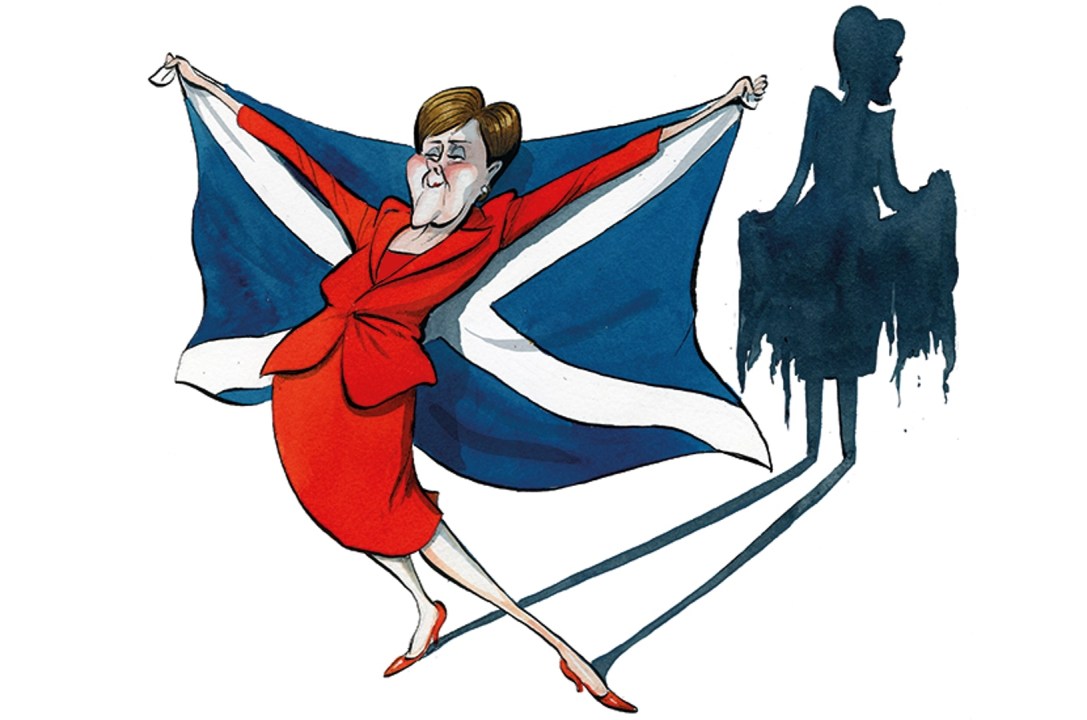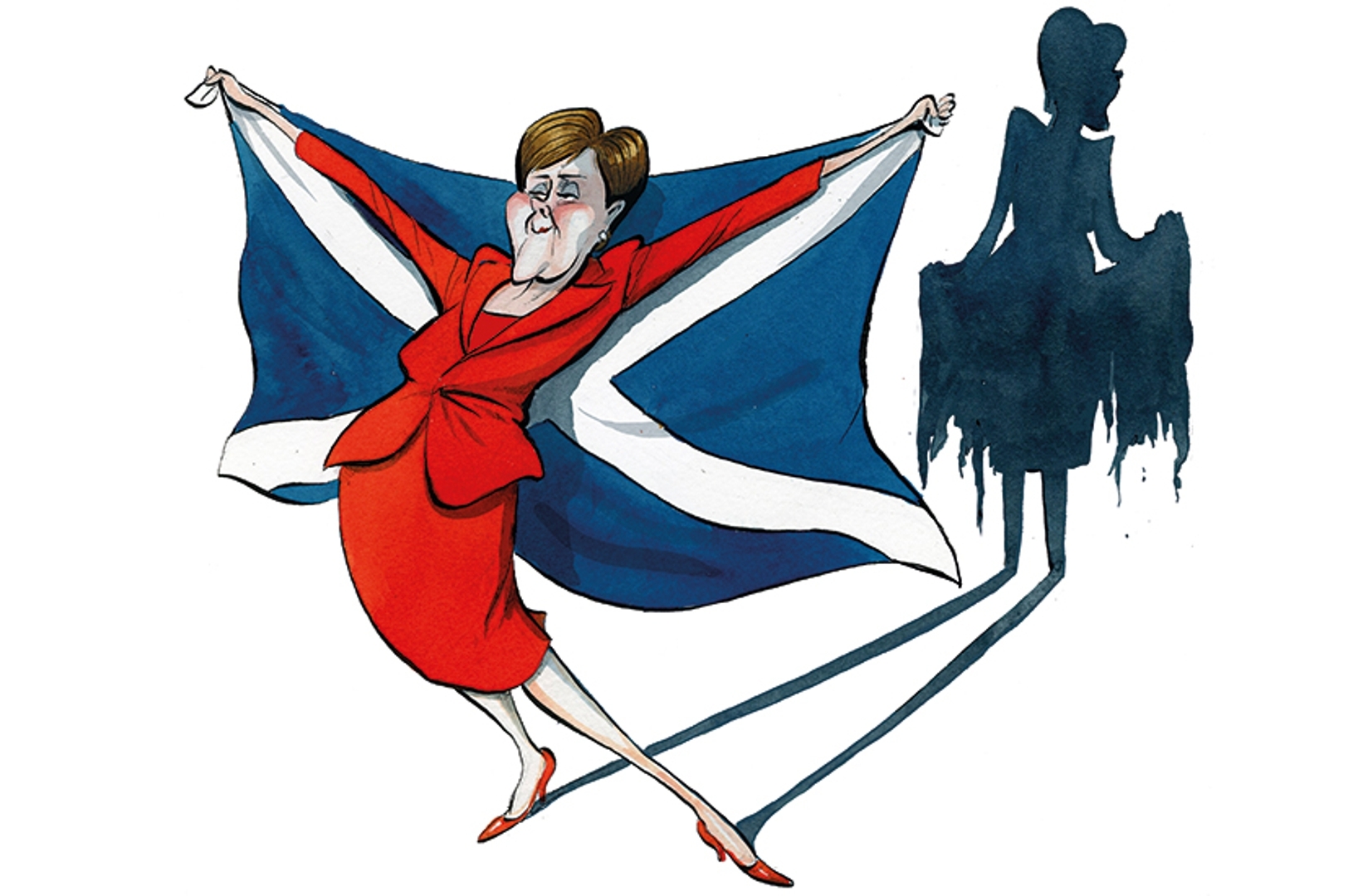For as long as it has been rumoured, and even more so since it was confirmed, Nicola Sturgeon’s appearance on Wednesday before the Holyrood committee investigating her government’s unlawful handling of complaints made against Alex Salmond promised to be a challenging, perhaps even chastening, moment for the First Minister.
Twin revelations tonight appear to reinforce that supposition. In spades. If Sturgeon’s administration was not facing crisis before, it undoubtedly is now. At the outset of this process — which followed Salmond’s acquittal on all charges made against him in the criminal trial — Sturgeon promised that she and her government would co-operate fully with the inquiry. Such words are cheap, of course, and require the backing of actions.
Those actions were posted missing. In place of candour, there has been obfuscation. Documents have been withheld and witnesses have demonstrated such inadequate powers of recall it is a wonder any of them rose to hold such senior positions within the civil service and the SNP alike. As the process has drawn on — Salmond and Sturgeon were supposed to have testified last year — the sense has grown that the government has had something, perhaps lots of somethings, to hide. This has always been something more easily smelled than proved but it has been a suspicion given credence by the intuitive thought that a government with nothing to hide would not behave in a manner seemingly designed to give the impression it has.
For months the Scottish government has refused to disclose the legal advice it received from external counsel before the government collapsed its own case, conceding the issue to Salmond, in January 2019. As Lord Pentland, the presiding judge, put it, the government’s investigation of two complaints made against the former First Minister was ‘unlawful’ and ‘tainted by apparent bias’. The case could have cost taxpayers the thick end of £1m.
SNP ministers, usually so quick to demand Westminster governments of whatever stripe publish the legal advice upon which they make their own decisions, have been unusually coy on this matter. So much so that what was once merely coy — the citing of custom and privilege — soon became stubbornness which in turn gave rise to further grounds for suspicion. The Scottish parliament twice demanded the advice be made public and the Scottish government twice declined to follow parliament’s instruction. (A side note here: Nicola Sturgeon accuses Salmond, his supporters, and her opponents of trashing Scotland’s democratic institutions so great is their zeal to entrap her. She might equally wonder if her own government repeatedly defying the will of the legislature is not itself a means by which that institution may be trashed.)
It was only when, today, John Swinney — the deputy First Minister — was threatened with a vote of no confidence that the government conceded. It relented because the Green party indicated it was minded to vote with the Tories, Labour and the Liberal Democrats and demand Swinney’s head. This, incidentally, should do something to cool over-heated talk that Scotland is some kind of ‘one party state’. The government is, for the time being, a minority one.
It is now beyond doubt that Sturgeon has not given a full or frank account of her involvement in this whole sorry saga
Suddenly, all the principles melted away for, lo, it turned out the government could publish the advice after all. Heavens above and all that.
Still, even a cursory examination of the paper trail reveals that there was indeed, and as long suspected, something worth hiding here. For on 31 October Roddy Dunlop — now the Dean of the Faculty of Advocates and thus Scotland’s senior QC — told the government that, following the disclosure that the government’s investigating officer had previously been in contact with the two women complainers, there was a more than healthy chance the government would lose the judicial review. Indeed, pressing on carried a real risk of asking counsel to ‘defend the indefensible’ (this latter meant in a purely legal sense, of course).
He also noted that he was ‘sufficiently concerned’ to contact the Lord Advocate, Scotland’s senior law officer and head of the Crown Office, who shared ‘both my firm advice that this issue will have to be disclosed, and my concern as to the potential repercussions for the wider case’.
And yet the government pressed on regardless. On the 6 December Dunlop and his co-counsel Christine O’Neill, one of the most highly-regarded lawyers in Scotland, advised that ‘the least worst option’ would be to concede Salmond’s petition. Despite that, on 11 December Scottish government emails also released on Tuesday night, report that at this stage the Lord Advocate was still ‘clear’ there was ‘no question of conceding the case’.
Then, on 19 December, the government’s counsels update their opinion in the light of new documents which have come to light. These make it clear that, in their view, the defence of the government’s position may now be ‘unstatable’. ‘Our dismay at this case deepens yet further’ they wrote, noting that the delay in producing the revenant documents was ‘unexplained and frankly inexplicable’ and ‘given the nature of the searches described by [Redacted] as having been undertaken, we regret that we simply cannot understand why these documents have been made available only now’. A kind interpretation might be that this is a cock-up of monumental proportions; alternative interpretations are available. The tone of the 19 December opinion strongly hints at lawyers coming, however regretfully, to the conclusion that the Scottish government is a client that may no longer represent on an ethical basis.
The next month even the government concedes that it cannot progress to the judicial review.
All this, you may think, is legal arm-wrestling. Where is the beef? The sirloin is served two ways: first, the refusal to publish this advice substantiates the sense of a government frantically engaged in an exercise of arse-covering. Second, the reluctance to concede the judicial review, despite counsel’s advice, appears to lend some weight to Salmond’s suggestion that the government wished to spin this civil case out for as long as possible in the hope it might be overtaken — and therefore paused — by the advent of the criminal case. Because otherwise, why would you continue on a course your own counsel argues is doomed? But perhaps there is an alternative explanation.
All of this may be thought embarrassing and it may be that if there is a conspiracy here it is one designed to cover up embarrassment rather than anything criminal. Still, a cover-up is a cover-up is a cover-up.
If this were Sturgeon’s only difficulty this evening it would be difficulty enough. But it is not. Other parts of Salmond’s testimony appear to have been confirmed by other witnesses and specifically by Duncan Hamilton, the former SNP MSP who is part of Salmond’s legal team.
In his own submission to the committee, Hamilton confirms a number of interesting points. First, he corroborates Salmond’s claim that in early March 2018 a senior government official gave the name of one of the two complainants to Geoff Aberdein, formerly Salmond’s chief of staff. This information was shared with Hamilton and Kevin Pringle (formerly the SNP’s chief spin doctor) during a conference call. Whether inadvertent or not, it seems extraordinary that senior officials would share the name of a complainant with an individual representing the person being complained about.
Second, Hamilton confirms that Nicola Sturgeon’s memory is unusually faulty when it comes to recalling when she learned of the complaints made against her predecessor. She has repeatedly said she first heard of them from Salmond herself at a meeting at her house on 2 April 2018.
Aberdein testified in court that he discussed the complaints with Sturgeon at a meeting in her office on 29 March. This meeting, Salmond avers, was organised by the First Minister’s team but has, remarkably, been forgotten about. According to Hamilton, ‘Mr Aberdein made me aware of that meeting and its purpose in advance’. Moreover, the 2 April meeting was arranged at the 29 March meeting, there being no other basis upon which the second encounter could otherwise have been arranged. It was Sturgeon who invited Salmond to her home, not a case of Salmond ‘popping in’ for a wee chat. At that meeting, ‘everyone in the room knew exactly why we were there. No introduction to the subject was needed and no one was in any doubt what we were there to discuss.’
Thirdly, Hamilton alleges that Sturgeon offered to intervene in the process. She has insisted this is not the case and that the evidence for her non-intervention is substantiated by the fact that what Alex Salmond wanted to happen — a mediation process — did not in fact happen. Hamilton, however, confirms that ‘the First Minister did offer to assist. We discussed mediation. My clear recollection is that her words were, “If it comes to it, I will intervene”.’
It never came to it, at least in part because Sturgeon subsequently changed her mind. As Hamilton notes, Sturgeon was entitled to do so but his evidence — which he is prepared to repeat under oath if necessary — further supports Salmond’s version of events, not Sturgeon’s.
Perhaps all will become clearer on Wednesday morning when Sturgeon appears before the committee. For her sake, it might have to. As matters stand — they may change — the Scottish Conservatives are preparing a motion of no confidence in the First Minister. That might better be left until after she has had her opportunity to defend herself but, at the time of writing, Salmond’s arguments seem stronger than they were 24 hours ago.
It is now I think beyond doubt that Nicola Sturgeon has not given a full or frank or candid or entirely truthful account to parliament of her involvement in this whole sorry saga. One may think that while at the same time believing that she has, as she puts it, always tried to do the right thing. Politics is not a game in which prizes are awarded for effort or participation, however. One may further sympathise with the unpalatable situation in which Sturgeon found herself without thinking that excuses her government of its incompetence or, much worse, the possibility it has on occasion acted in this affair with a degree of malice.
Not all offences are created equal. Some occasion a higher tariff than others. Misleading parliament inadvertently is not the same as doing so deliberately or knowingly. The latter must ordinarily be a resigning matter; the former typically might not be. To this observer, Sturgeon is plainly culpable of misleading parliament and equally culpable of both failing to report her discussions with Salmond to civil servants in a timely manner and of presiding over a government process of extraordinary incompetence. Intent must be distinguished from outcomes, however, and that is the fine edge upon which Nicola Sturgeon’s political future may now hang.
Should you find yourself in a hole, the traditional advice is to throw away your shovel. In this instance, however, the Scottish government give every impression of thinking it possible to escape the hole in which they put themselves only to discover that each leap lands them in a series of progressively deeper holes. In the end, that sort of thing is liable to catch up with you.








Comments